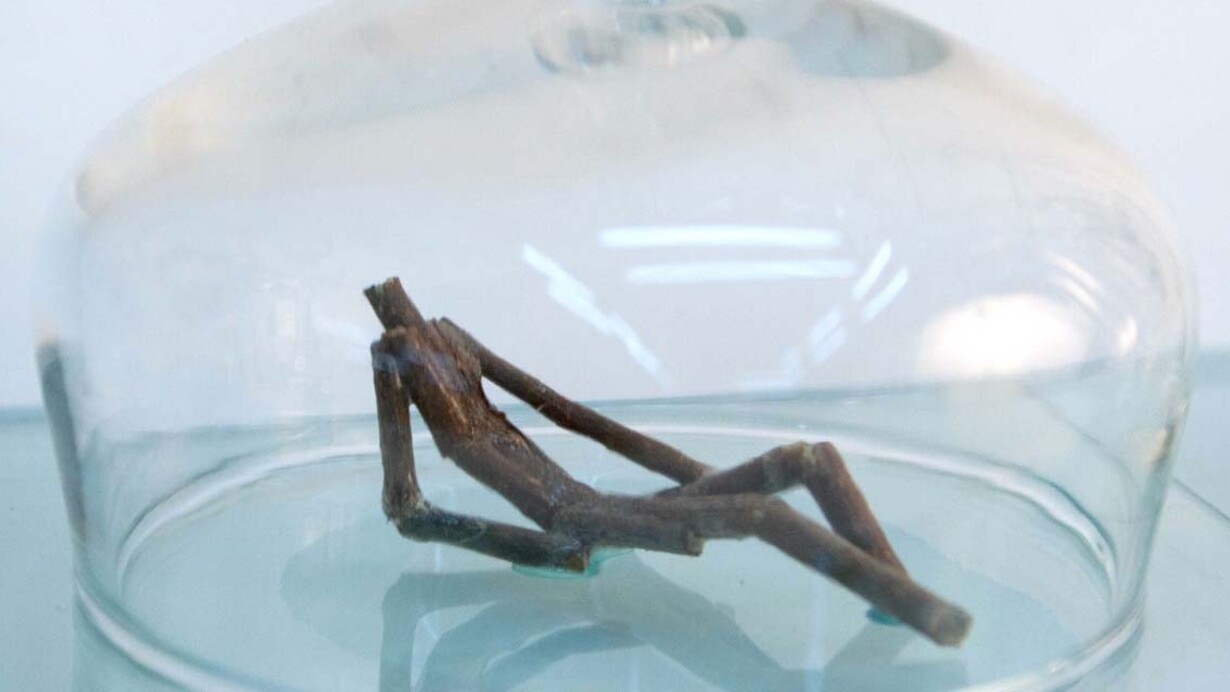Byung-Chul Han opens his text with a beautiful phrase by Peter Handke: "I live by what others ignore about me".
Hermetic architectures made of glass, wooden miniatures of little bugs-like men in which the artist has recently added feathers – to give some respite, he says; an assemblage of installations that follows a vertical movement, made from modules different by type and size, whose aesthetic component is very powerful. For Claudia Maina, transparency is an interpretative script.
The reduction of what I am to what can be seen is one of the most disturbing aspects of the principle of transparency adopted in her research, and present in all her works. Subject and object at the same time, her representations are like many alienating Wunderkammers, with powerful references to ex-votos and their glass bells.
As an analyst, she tightens the field asking for attention and closeness, shifting the vision from that of a large square to that of a phantom window; beyond its opacity, the darkness, which is non-visible, but real.
The transparency, the complete turning of the inside into an exhibitive outside, represents for Maina the privileged means of this very process of intimate expropriation of every specificity, of every otherness, of every negative. Thus, in the name of transparency, every privacy, the intimate space of confidentiality, modesty, and dignity, assumes a formal levelling, a homologation that is the very analogy of transparency. Man becomes a functional element of the system.
Chosen by the artist as a material medium, glass is used to build partitions without partitions, walls without walls, solids and volumes that give the impression of not being such, where the myth of architectural transparency results in the concept of pure visibility, the idea that what is transparent offers no barrier to the eye. The illusion of contiguity and unlimitedness goes along with two particularly significant phenomena: the tendency to dematerialization and the imperative of smoothness, both related to the physical characteristics of glass and transparent materials in general. By allowing the light to leak, each slab, each diaphanous wall, creates an illusion of immateriality, an effect of intangibility; likewise, its slab or wall nature makes it smooth to the touch, flat and uniform, free from roughness and ripples... One thus notices that the last one hundred and fifty years of the Western world have been marked by deep, persistent and often interdependent contradictions: our age is a bipolar one. Transparency and truth are not identical; nor is it true that the panoptic – the control structure in which we are immersed – is un-perspective, devoid of a centre and made only of diffused control, the sousveillance imagined by Brin (David Brin, The Crystal Spheres, 1984; The Transparent Society, 1998).
What the art of Claudia Maina brings to the surface and makes clear is the problem of transmitting the sense of the impossible passage from the user to the artist. The paradox of transparency, visible throughout the artist's production, lies in the construction of an idealized kinematics, endowed with the virtue of showing nothing but absence.
She transforms the subject into an object of exchange, under the opaque shadow of the enjoyment of the Other, now scattered in a virtual ubiquity.
She questions the very idea of "vision" that transparency would like to support. What is there to see, and what does one want to see?
What is real in the game?
Only suspended and alienating forms, like ghosts; little men-bugs that are now aliens. How can we avoid for the ideal of transparency to turn into the contemporary persecution nightmare, like the one prefigured in the realization of Bentham's Panopticon as a principle of social control, where the Other sees everything without being seen?
In his essay Transparenzgesellschaft (The Transparency Society), Byung-Chul Han identifies in the liberal societies' obsession for transparency a powerful homeostatic force, "a systemic coercion that involves all social processes and forces them to a profound change."
















